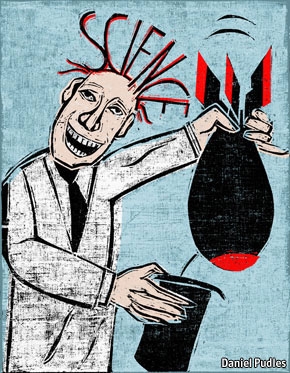(单词翻译:单击)
Books and Artts; Book review;
文艺;书评;
Conundrums of science;
科学谜题;
What is it for?
科学究竟有什么用?
Scinece in the 20th century and beyond; by Jon Agar;
20世纪后科学;乔·艾格著;

SCIENCE works with problems by making them into manageable, manipulable abstractions. Jon Agar's ambitious new book sets out to synthesise the insights of many recent historians of science. These might be anything from a field biologist's notes of lemming populations on Spitzbergen to a physicist's creation of muon tracks in a cloud chamber, or from a set of equations in the mathematical imagination to a vast computer model of the world's climate.
用科学的方法处理问题就是将这些问题转化成易管理且可操作的抽象概念。乔·艾格将近代众多科学史家的见解都融入在他的新作当中,真可谓是大胆的创作。在这本书中你将会看到野外生物学家对于斯匹茨卑根群岛上的旅鼠种群的阐述,物理学家在云室里创建的μ介子轨迹,利用数学概念思考出的一组方程式,以及巨型计算机模型中的全球气候。
Doing science is making these abstractions. The history of science is understanding how particular abstractions come to be accepted as the right way of producing solutions—and how problems get chosen in the first place. Sometimes the problems are those of the people paying for the science; sometimes they are posed by developments the scientists are interested in; sometimes they are problems that grow out of science itself.
科学研究就是这么抽象。科学史就是在逐步认知如何以适当的方式解决某些特殊的抽象事物,使它们被大众接受,以及如何在第一时间发现所面临的问题。有些时候是献身科学事业的人们遗留了许多问题,有时候是科学家们针对他们所感兴趣的发展领域而提出了某些问题,而有时是科学本身产生了问题。
As Mr Agar shows, the great problem-posing processes of the 20th century were its wars. The two world wars and the cold war ratcheted up the spending on science, changing its organisational basis, its political setting and its subject matter. The less obvious aspects of war and science—for example, the introduction of psychoanalysis into British medicine courtesy of shellshock—are given their due, as well as the central Faustian tragedy of the development of the atom bomb.
正如艾格先生所说,许多重大问题都是在二十世纪的战争期间被提出的。二战和冷战都加大了花费在科学上面的时间和精力,改变了其组织基础、政治环境和作战目的。而战争和科学较不明显的方面也受到了一定的关注,例如,由于弹震症的出现将精神分析学引入英国医学中,又如原子弹的研发(虽然是个浮士德式的悲剧)也受到了某种认可。
The bomb that graces the cover of the book has come to stand for the power of science. But Mr Agar's history is more illuminating on the less obvious story of science's role in problems of control. Throughout the book, the reader is struck by how much people have seen a lack of control over others as a problem, and science as a source of solutions.
一朵核爆蘑菇云出现在本书精美的封面上,引申出强大的科学力量。但是艾格先生更倾向于阐述科学在控制问题上所起到的作用,即使这个作用并非显而易见。通读全书,读者会震惊于因为缺乏控制而在诸多方面所引起的问题,而科学便是解决这一问题的唯一途径。
Lewis Terman, developer of intelligence tests, for example, dreamed of psychology as “a science of human engineering” in the 1920s. Eugenicists sought, by combining, in the words of J.B.S. Haldane, the offices of “the policeman, the priest and the procurer”, to control both the actions of their social inferiors and the course of evolution. Devotees and fellow travellers, such as Julian Huxley and H.G. Wells, saw in the biological sciences “the ultimate collective control of human destinies”. The Rockefeller Foundation dreamed of bringing the dangerous “psychobiology of sex” under “rational control” as part of its “Science of Man” programme. And Norbert Wiener, father of cybernetics, sought to combine the human and the machine into a system—initially, but not only, an anti-aircraft system—that was defined by the way in which it controlled itself.
举例来说,智力测验的开发者路易斯·推曼在1920年代将心理学设想为人体工程学。优生学家根据遗传学家霍尔丹的学说,并与警方、牧师和拉皮条者通力合作,力图控制弱势群体的行为和人类的进化过程。像朱利安·赫胥黎这样的生物学家和与其志同道合的赫伯特·乔治·威尔斯认为生物科学可“最终控制的人类的整体命运”。作为“人类科学”计划的一部分,洛克菲勒基金会希望对危险的“性心理生物学”进行“理性控制”。控制论的创立者诺伯特·维纳力图将人类和机器结合在一个系统中,即防空系统,这是最初的形式,但并非单一形式,该系统的性质是自控。
At first blush these look like futures that simply failed. But the story is more complex. The Rockefeller Foundation's vision of a “Science of Man” led it to foster a new “molecular biology” at CalTech and other institutions. Today's control of crops through their genes and children through their pharmaceuticals can both be traced back, in part, to that intervention. And then there is the remarkable story of Song Jian. A Chinese engineer who had been schooled in control theory in Moscow just after Stalin's death (at which point cybernetics, previously bourgeois and reactionary, became acceptable), he rose to pre-eminence in China's military-industrial complex. Attending a meeting on control theory in Helsinki in the 1970s, he became convinced of the power of crude computer models like those of the Club of Rome's “Limits to Growth”. Importing such modelling to his power base at the Chinese missile and space-flight ministry he became crucial in the enactment of the one-child policy in the 1980s.
乍看下,这些内容毫无希望可言,但其实并非如此。洛克菲勒基金会对于“人类科学”的愿景促使其在加州理工学院和其他院校发展了“分子生物学”这个新学科。如今,通过基因可以对农作物进行控制,并且通过药物能对儿童进行控制,在某种程度上都能对事物进行一定的干预。接下来看一看宋健的非凡故事。他是一名中国工程师,就在斯大林病逝后不久(此时控制论、曾经的资产阶级和反动分子开始为人们所接受),他前往莫斯科学习控制理论,随后在中国的共军联合体中成为一名出类拔萃的人物。1970年代,宋健在赫尔辛基参加了一场有关控制理论的会议,他开始认识到原始计算机模型的力量,正如罗马俱乐部发表的《增长的极限》依据的计算机模型一样,随后他便将这类模型引入他在中国导弹与航天部门的动能基地加以研究。他也是1980年代独生子女政策的主要制定者。
Mr Agar's book is somewhat biased towards the physical sciences and it has some odd gaps. Seeing the molecular biology of the 1960s as an information science, Mr Agar overlooks Peter Mitchell, whose breakthrough in understanding that cells store energy, not in molecules, but in potential differences revealed an aspect of life hitherto undreamed of. There is nothing on the fluoridation of water, and too little on nutrition.
艾格先生在书中对自然科学的存有一些偏见,但该书在某些领域的也有空白。他不仅将1960年代的分子生物学视为信息科学,还忽视了彼得·米切尔的观点,这位生物化学家的一项突破性研究是细胞能够通过电位差而不是分子储存能量,这个理论体现在生活中的方方面面,至今为止都让人类难以想象。书中也没有对饮水加氟法进行阐述,在营养学方面也较少被提及。
Some of the later material on trends too close to the present might well have been omitted. Given the central role of war, a book limited to what Eric Hobsbawm has called the short 20th century—1914 to 1991—might have served better. But overall, Mr Agar has abstracted and made manageable a range of rich and informed analysis. Anyone who thinks seriously about science, and about how it is used, will find it a very useful source of new ways to appreciate both problems and solutions.
后期对科学趋势的一些研究由于很接近当今的研究而被省略了。鉴于埃里克·霍布斯鲍姆称二十世纪(1914年至1991年)乃是个“短暂的世纪”,以及战争在本书起到的核心作用,这样的安排比较妥当。但总体来说,艾格先生在本书中做出了一系列充分且通透的分析,虽然抽象,但易于掌握。认真研究并运用科学的人都会发现书中许多有用的科学方法会帮助他们解决问题并发现对策。


